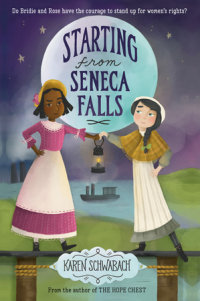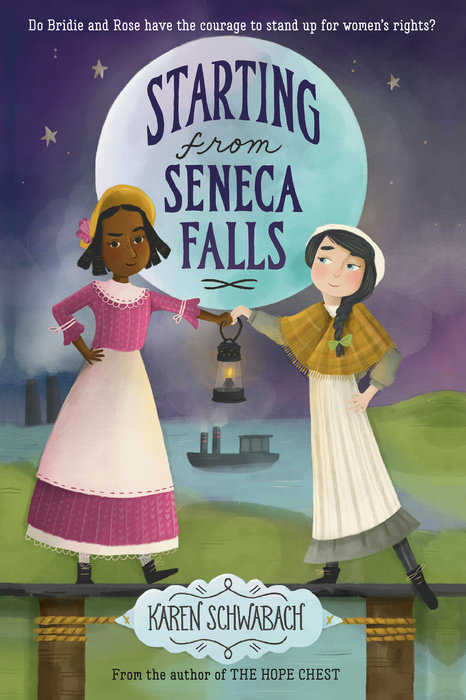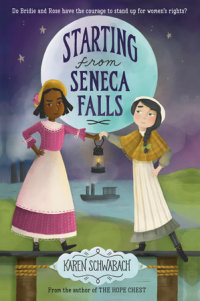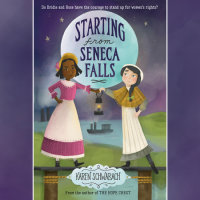Starting from Seneca Falls
It took voices big and small to win women the right to vote. Join the rallying cry of the women's suffrage movement in this empowering historical fiction novel from the author of The Hope Chest!
Bridie's life has been a series of wrongs. The potato famine in Ireland. Being sent to the poorhouse when her mother's new job in America didn't turn out the way they'd hoped. Becoming an orphan.
And then there's the latest wrong—having to work for a family so abusive that Bridie is afraid she won't survive. So she runs away to Seneca Falls, New York, which in 1848 is a bustling town full of possibility. There, she makes friends with Rose, a girl with her own list of wrongs, but with big dreams, too.
Rose helps Bridie get a job with the strangest lady she's ever met, Mrs. Elizabeth Cady Stanton. Mrs. Stanton is planning a convention to talk about the rights of women. For Bridie and Rose, it's a new idea, that women and girls could have a voice. But they sure are sick of all the wrongs. Maybe it's time to fight for their rights!
An Excerpt fromStarting from Seneca Falls
1
Taken On Trial
The cell was five feet by nine feet and stifling hot. It contained a bucket, a pile of dirty straw, and Bridie. And it smelled of the bucket.
Up near the ceiling was a small, barred window. Bridie jumped up, managed to grab the bars, and walked herself up the wall. She had to turn her head sideways to peer out.
Through the small slit she could see the fields and the woods. And just a corner of the graveyard . . . she looked away quickly. She could see the other poorhouse children out in the cabbage field, weeding. A couple of the best-trusted boys were using hoes, but the rest of the children were down on their knees, pulling up weeds with work-roughened hands.
The children were nearly all younger than Bridie, who was eleven. Boys and girls her age were usually indentured soon after they came in. Especially if they came in with their parents. Parents who had ended up in the poorhouse were not considered suitable company for their own children.
But Bridie had been allowed to stay while her mother’s illness lasted. And now that that was over with . . . well, Bridie was trouble.
She asked questions. She pointed out the problems with things. She had opinions about the way things ought to be. She spoke when not spoken to.
And so here she was, locked up again on bread and water.
Beyond the fields she could see the woods, where the boys and men cut wood for the fires and for the poorhouse keeper, Mr. Fitch, to sell.
The poorhouse was out in the middle of nowhere, far from the bustling towns of the Finger Lakes. Because the poorhouse housed the people nobody wanted to have to see. Not just poor people, but folks who had turned out simpleminded, or been injured badly at work, or had just gotten too old to work, or had become a bit peculiar.
Bridie heard iron-tired wheels out on the road, and the clop of a horse’s hooves. She cricked her head around, trying to see if it was a buggy or a wagon. Then the sound of its wheels was drowned out by howling.
Old Mad Janet had gone off again.
Ha. They’d be sorry now that they’d locked Bridie up. She was just about the only person who could manage Mad Janet.
Then Bridie had another thought. There were only four cells in the poorhouse--only two for women and girls. If they locked Mad Janet up, they might have to let Bridie out.
They weren’t supposed to keep you in the cell on bread and water for more than two days; that was in the rules. But they did. Bridie thought she had been here for longer, boiling all day and freezing in the cold upstate New York summer nights. She had kept time by the gong that awakened the inmates at dawn, and the gongs that called them to their silent meals, and the gong that called them to Sunday prayers, and the gong that sent them to bed.
At least three days. Maybe four.
“Rubbish bums!” yelled Mad Janet. “Take the mouse war! They were old and fine and my people were kings, you know, kings! While yours were slippery dockets and all the whales!”
Bridie let go of the bars and dropped, her feet hitting the wooden floor with a thump.
Mad Janet kept going. “KIIIIINNNNGGGGSSS!”
CRASH! Something hit the wall--maybe a wooden bench. If Janet was throwing things, that could be Bridie’s ticket out of here.
There was the sound of a scuffle. Mad Janet yelled and cursed. Bridie braced herself to run out the second the door opened--if it did.
Mad Janet let out a low-pitched, keening howl. It came closer as they dragged her up the stairs.
Now, which cell would they open?
Bridie held her breath and hoped.
The door swung open. Mr. Fitch and his son wrestled Mad Janet into the room.
Mad Janet looked at Bridie for a moment with perfect clarity. “I splotted the turnkeys, matey,” she said. “It’s bows and anchors to yours, and mink jelly on Thursdays.”
“Thank you,” Bridie whispered, and darted out. She ran across the women’s ward and down the stairs, eager to be outside at last in the clean air.
But Mrs. Fitch stood at the bottom of the stairs, blocking her way. “Where do you think you’re going?”
“Out to the cabbage field to work,” said Bridie. “Mr. Fitch told me--”
“No, he didn’t. In here.” She grabbed Bridie by the collar and marched her into the office.
It was a bare room, like all the others. The whole place smelled of failure and boiled cabbage. Painted on the wall in tall black letters were the words worthy of notice: self-government, quietude, and peace are blessings. There was a table, two chairs, and a stack of ledgers, recording each poorhouse inmate’s date of arrival, personal information, and (in parentheses, where applicable) date of death. Bridie’s name was in those ledgers, she knew.
So was her mother’s.
A large man was sitting in one of the chairs. He looked like he could lift a full-grown hog under each arm, and throw both hogs at you if he didn’t like you. He stared at Bridie as if he didn’t like her.
“Scrawny little thing, ain’t she?” he said.
Bridie didn’t like him much either. But she held her tongue; she’d only just gotten out of the cell.
A tall, thin woman with a face like a missed dinner stood beside him. “Any help I can get, Mr. Kigley--”
“Did I ask you to speak?” said Mr. Kigley.
Mrs. Fitch seated herself at the table and opened a ledger. “These are the Kigleys,” she told Bridie.
Bridie stood there and looked at Mrs. Kigley. Mrs. Kigley looked back, her mouth a thin hard line.
Then Bridie glanced down at the open ledger. She saw her own name.
Brigid Gallagher. Born: Ireland. Aged. 11 yrs. Admitted with mother (mother died May 9, 1848).
Mr. Kigley was still looking Bridie over. “How much?” he asked.
“It costs nothing to take a poorhouse child on trial,” said Mrs. Fitch.
“I mean, how much will you pay me?”
“We do not,” said Mrs. Fitch. “You will have the girl’s labor, and that is payment enough.”
Mr. Kigley didn’t seem to like that. “What if I get her bound over? Might as well buy the whole hog.”
“We prefer that you take them on trial,” said Mrs. Fitch firmly. “To ensure that all parties are satisfied with the arrangement.”
Mrs. Fitch and Mr. Kigley gazed at each other, hard and intractable.
“Let me talk to your husband,” said Mr. Kigley.
The stairs creaked as Mr. Fitch and his son descended. Mad Janet’s low keening was a distant howl in the background, like dogs in the night.
Mr. Kigley heaved himself to his feet, and he and Mr. Fitch shook hands and talked about the crops. Bridie looked out the window at the other children, weeding in the sun. She thought about what was going to happen to her. If the Kigleys took her--well, she honestly didn’t hold out much hope for them, but it had to be better than the poorhouse. Didn’t it?
But there was no way she was going to let herself be bound to them. She’d seen it happen to other children in the three months she’d been at the poorhouse, and off they’d gone, willy-nilly. When you were indentured, you didn’t get paid a thing until you were twenty-one years old. And you couldn’t leave. If you did, they advertised for you in the newspapers and had you sent back.
The thought made Bridie’s stomach hurt.
She was alone, and a long way from Ireland.
“Two weeks’ trial, then,” Mr. Fitch said, and he and Mr. Kigley shook hands.
And Bridie watched as Mrs. Fitch wrote in the ledger, next to Bridie’s name:
Taken on trial by Chas. Kigley, June 25, 1848.
Bridie breathed a sigh of relief. She was not to be indentured. Not yet.
2
The Signs Are Not Promising
Bridie didn’t have any things to pack. The poorhouse inmates were issued clean clothes every Sunday morning, but they weren’t their own clothes. Bridie had only the gray cotton dress she stood up in, an apron, gray stockings, a bonnet, and a pair of laced-up, ankle-high shoes.
The Kigleys’ wagon was waiting outside. A dusty horse stood patiently, flicking his ears at flies.
“Now, then, Brigid,” said Mr. Fitch, the poorhouse keeper.
And Bridie knew what he was going to say, because she’d heard him say it to all the other kids. There was stuff about duty, and remembering that we are put on earth to work hard, and not to become a charge on the county, and that with hard work and obedience she could grow up and become--
Here the lecture changed according to whether you were a boy or girl. If you were a boy you could become all sorts of things, according to Mr. Fitch’s lecture. If you were a girl you could merely marry them.
“And above all, remember that you will one day become the mother of citizens of this great Republic,” Mr. Fitch finished.
The horse plopped out a pile of steaming manure onto the ground.
“Where am I going?” Bridie said.
“Speak when spoken to,” snapped Mrs. Fitch.
“To the Kigleys’ farm,” said Mr. Fitch.
Figured. Farmers needed more help than anyone else. The work was endless.
Suddenly Bridie realized she could be leaving here forever. This could be her last chance to say goodbye.
While Mr. Kigley unhitched the horse from the hitching post, and Mrs. Kigley gathered her skirts to climb into the wagon, Bridie ducked away, ran between the barn and the oven house, and around behind the poorhouse to the cemetery.
The graves in the cemetery were unmarked, mounds subsiding into the rocky New York soil. But Bridie knew which one she was looking for. She ran all the way to the farthest row and the third-to-last grave.
She knelt down and put her hand on it. She felt as if there was something she ought to say, but she couldn’t think what it was.
She heard footsteps coming toward her, and she quickly picked up a pebble from the grave and stuck it in her apron pocket, to remember by. Then she looked up and saw Mrs. Fitch coming toward her.
Bridie braced herself in case she was about to get smacked.
But Mrs. Fitch’s face risked a bit of sympathy. “Come along, Brigid,” she said, not unkindly. “The Kigleys are waiting. Don’t give them a bad impression of you.”
Too late for that, Bridie thought, as she followed Mrs. Fitch back to the wagon.
“After all, it’s only for two weeks,” said Mrs. Fitch. “Then if they don’t find you suit, they’ll bring you back and we will try again.”
“What if I don’t find they suit?” said Bridie. This was the sort of question that tended to get her into trouble.
“That is not the attitude with which you should begin,” said Mrs. Fitch. “Think of your duty, Brigid. Always, always, think of your duty.”
Bridie looked up at Mrs. Fitch and noticed for the first time how tired she looked.
“If you think, every morning upon rising, ‘I will do my duty,’ and every night, upon retiring, ‘I have done my duty,’ you will find it a great comfort.”
Bridie doubted this very much.
The Kigleys were waiting, looking grim and annoyed. Bridie climbed up into the back of the wagon and sat in the hay.
“Git up, Dobbin,” said Mr. Kigley.
The horse flicked his ears, the wagon creaked, and the journey began. Soon they were trotting down the road, and the poorhouse was growing smaller in the distance. Bridie closed one eye, and found she could blot it out with her thumb.
Nobody said anything.
The wagon rolled past wheat fields and pastures, and farmhouses with chickens pecking in the dooryard. The sweet smell of milkweed drifted up from the roadside. Bridie began to think the Kigleys were uncommon silent folk. She couldn’t say anything, of course: she hadn’t been spoken to, and anyway she was feeling her way, seeing what these people were like. So far the signs weren’t promising.
Still, it was good to be out in the world again, seeing the wide open spaces that this America was made of. She looked back. She could no longer see the poorhouse. She clutched the pebble in her pocket.
She wondered who would be able to manage Mad Janet now.
Bridie knew she could have been sent away before her mother died. She wasn’t sure if it was Mrs. Fitch or her husband who had prevented it. There was kindness in the world, after all, even in places where it hardly dared to show its head.
She looked at where the sun was, and figured they were headed north, toward Seneca Falls. Bridie chirked up. Seneca Falls was the mill town where she used to live, with her mother--well, where she’d lived for a little while, anyway. Seneca Falls wasn’t the middle of nowhere; it was the middle of everywhere. It had a turnpike and a canal and a railroad.
Starting from Seneca Falls, you could go anywhere in the world.
Sure enough, they were drawing closer to Seneca Falls. Bridie could see the church steeples, and then the tall stone mill where her mother had worked, and then the other mills and the houses.
Then, just as it looked like they were going to come into the town proper, Dobbin turned at the corner by the American Hotel and headed out of town again.
Bridie’s heart sank. Well, of course a farmer wasn’t going to live right in town. Maybe they’d be near town, anyway.
They passed a schoolhouse, and a big house on a hill where two little white boys were playing in the yard, watched over by a black girl about Bridie’s age. No, not black, Bridie corrected herself; it was more polite to say colored or a girl of color.
The children were too far away for Bridie to see clearly. But the older of the little boys waved, and Bridie waved back, and then the girl waved too.
If only Bridie were going to live in that house, with those friendly-looking people.
No such luck. The wagon was out of town now, heading down toward the shore of Cayuga Lake.
Dobbin drew to a stop. A wooden tollgate blocked the way.
A woman came out of the stone house beside the gate.
“Two shillings to cross, please,” she said.
It had seemed odd to Bridie, when she’d first arrived, that Americans used English money, mixed in with their own.
“But my wagon’s empty!” said Mr. Kigley. “We ain’t come to trade, we ain’t boughten nothing!”



